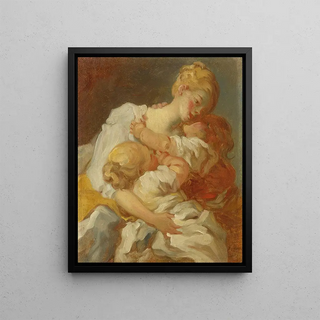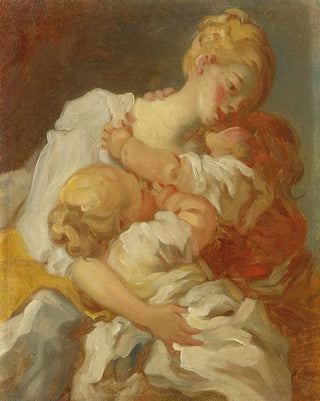Art print | Les Baisers maternels - Jean-Honoré Fragonard


View from behind

Frame (optional)
In the enchanting world of 18th-century art, "Les Baisers maternels" by Jean-Honoré Fragonard stands out for its delicacy and expressiveness. This artwork, emblematic of rococo, evokes a poignant tenderness between a mother and her child, capturing a moment of intimacy and sweetness. The scene depicted by Fragonard is a true ode to maternal love, where every gesture, every glance, resonates with palpable emotion. The light, colors, and shapes harmonize to create an atmosphere that is both serene and vibrant. The art print Les Baisers maternels - Jean-Honoré Fragonard allows for rediscovering this masterpiece, offering an immersion into the refined and delicate world of the painter.
Style and uniqueness of the work
Fragonard's style is characterized by a lightness and fluidity that transcend the conventions of his time. In "Les Baisers maternels," elegant curves and pastel shades dominate the composition, giving the piece an almost dreamlike quality. The depiction of the figures, with their delicate expressions and natural postures, demonstrates an exceptional mastery of human anatomy and a deep understanding of emotions. Fragonard skillfully plays with light, creating soft shadows that accentuate the tenderness of the scene. This work is not only a testament to the artist's technical skill but also a reflection on human relationships, capturing a fleeting yet eternal moment. The singularity of "Les Baisers maternels" lies in its ability to evoke universal feelings, making each view of this canvas unique and personal.
The artist and his influence
Jean-Honoré Fragonard, born in Grasse in 1732, is one of the most representative painters of the rococo movement. A student of François Boucher, he developed a style that is his own, combining sensuality and lightness. His work profoundly influenced his contemporaries and subsequent generations, notably through his bold approach to themes of love and daily life. Fragonard was able to capture the spirit of his era

Matte finish

View from behind

Frame (optional)
In the enchanting world of 18th-century art, "Les Baisers maternels" by Jean-Honoré Fragonard stands out for its delicacy and expressiveness. This artwork, emblematic of rococo, evokes a poignant tenderness between a mother and her child, capturing a moment of intimacy and sweetness. The scene depicted by Fragonard is a true ode to maternal love, where every gesture, every glance, resonates with palpable emotion. The light, colors, and shapes harmonize to create an atmosphere that is both serene and vibrant. The art print Les Baisers maternels - Jean-Honoré Fragonard allows for rediscovering this masterpiece, offering an immersion into the refined and delicate world of the painter.
Style and uniqueness of the work
Fragonard's style is characterized by a lightness and fluidity that transcend the conventions of his time. In "Les Baisers maternels," elegant curves and pastel shades dominate the composition, giving the piece an almost dreamlike quality. The depiction of the figures, with their delicate expressions and natural postures, demonstrates an exceptional mastery of human anatomy and a deep understanding of emotions. Fragonard skillfully plays with light, creating soft shadows that accentuate the tenderness of the scene. This work is not only a testament to the artist's technical skill but also a reflection on human relationships, capturing a fleeting yet eternal moment. The singularity of "Les Baisers maternels" lies in its ability to evoke universal feelings, making each view of this canvas unique and personal.
The artist and his influence
Jean-Honoré Fragonard, born in Grasse in 1732, is one of the most representative painters of the rococo movement. A student of François Boucher, he developed a style that is his own, combining sensuality and lightness. His work profoundly influenced his contemporaries and subsequent generations, notably through his bold approach to themes of love and daily life. Fragonard was able to capture the spirit of his era






